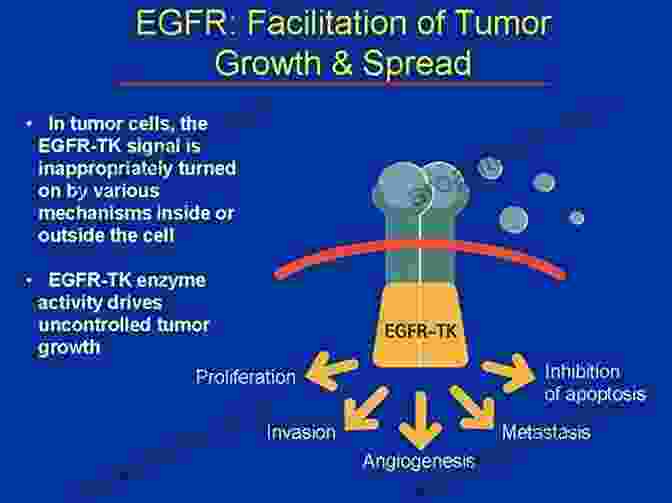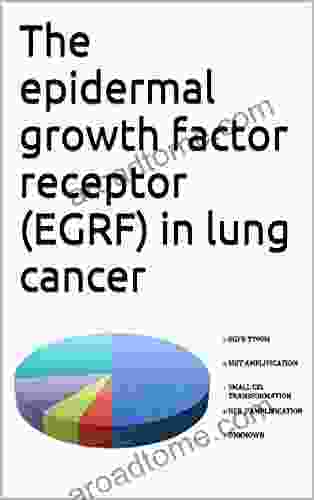The Epidermal Growth Factor Receptor EGFR in Lung Cancer: A Comprehensive Guide

Lung cancer is the leading cause of cancer-related death worldwide, with over 1.8 million new cases diagnosed each year. The Epidermal Growth Factor Receptor (EGFR) is a transmembrane protein that plays a critical role in the development and progression of lung cancer. EGFR is frequently mutated in lung cancer, and these mutations lead to the activation of the receptor and downstream signaling pathways, which in turn promote cell growth, proliferation, and survival.
4.2 out of 5
| Language | : | English |
| File size | : | 878 KB |
| Text-to-Speech | : | Enabled |
| Screen Reader | : | Supported |
| Enhanced typesetting | : | Enabled |
| Print length | : | 23 pages |
| Lending | : | Enabled |

The development of EGFR tyrosine kinase inhibitors (TKIs) has revolutionized the treatment of lung cancer. EGFR TKIs are targeted therapies that inhibit the activity of EGFR, thereby blocking the downstream signaling pathways that promote cancer cell growth and survival. EGFR TKIs have been shown to be effective in the treatment of patients with EGFR-mutant lung cancer, and they have improved survival outcomes for these patients.
Biology of EGFR
EGFR is a member of the ErbB family of receptor tyrosine kinases. EGFR is activated by binding to its ligands, which include EGF, transforming growth factor alpha (TGF-alpha),and amphiregulin. Upon activation, EGFR undergoes dimerization and autophosphorylation, which leads to the activation of downstream signaling pathways, including the MAPK, PI3K, and JAK/STAT pathways.
These signaling pathways play a critical role in regulating cell growth, proliferation, differentiation, and apoptosis. In normal cells, EGFR signaling is tightly regulated to ensure that cell growth and proliferation are controlled. However, in cancer cells, EGFR signaling is often dysregulated, leading to the uncontrolled growth and proliferation of cancer cells.
EGFR Mutations in Lung Cancer
EGFR mutations are common in lung cancer, occurring in approximately 15-20% of patients. EGFR mutations are more common in patients with adenocarcinoma, which is a type of lung cancer that arises from the cells that line the air sacs in the lungs. EGFR mutations are also more common in patients who are never smokers or light smokers.
There are several different types of EGFR mutations, but the most common type is an exon 19 deletion. Other common EGFR mutations include the L858R point mutation and the exon 21 L861Q point mutation. EGFR mutations lead to the activation of the receptor and downstream signaling pathways, which in turn promote cell growth, proliferation, and survival.
Clinical Significance of EGFR Mutations
EGFR mutations have important clinical implications for patients with lung cancer. Patients with EGFR-mutant lung cancer are more likely to respond to treatment with EGFR TKIs. EGFR TKIs have been shown to improve survival outcomes for patients with EGFR-mutant lung cancer, and they are now considered the standard of care for these patients.
In addition to predicting response to EGFR TKIs, EGFR mutations can also be used to guide other treatment decisions. For example, patients with EGFR-mutant lung cancer are less likely to respond to chemotherapy, and they may be more likely to benefit from treatment with immunotherapy.
Therapeutic Implications of EGFR Mutations
The development of EGFR TKIs has revolutionized the treatment of lung cancer. EGFR TKIs are targeted therapies that inhibit the activity of EGFR, thereby blocking the downstream signaling pathways that promote cancer cell growth and survival. EGFR TKIs have been shown to be effective in the treatment of patients with EGFR-mutant lung cancer, and they have improved survival outcomes for these patients.
There are a number of different EGFR TKIs that are currently available for the treatment of lung cancer. These include erlotinib (Tarceva),gefitinib (Iressa),afatinib (Gilotrif),and osimertinib (Tagrisso). EGFR TKIs are generally well-tolerated, and the most common side effects include skin rash, diarrhea, and fatigue.
EGFR TKIs are not curative for lung cancer, but they can prolong survival and improve the quality of life for patients with this disease. EGFR TKIs are typically given until the cancer progresses or the patient experiences unacceptable side effects.
EGFR is a critical player in the development and progression of lung cancer. EGFR mutations are common in lung cancer, and they have important clinical implications for patients. EGFR TKIs are targeted therapies that inhibit the activity of EGFR, and they have been shown to be effective in the treatment of patients with EGFR-mutant lung cancer. EGFR TKIs have improved survival outcomes for patients with EGFR-mutant lung cancer, and they are now considered the standard of care for these patients.
4.2 out of 5
| Language | : | English |
| File size | : | 878 KB |
| Text-to-Speech | : | Enabled |
| Screen Reader | : | Supported |
| Enhanced typesetting | : | Enabled |
| Print length | : | 23 pages |
| Lending | : | Enabled |
Do you want to contribute by writing guest posts on this blog?
Please contact us and send us a resume of previous articles that you have written.
 Book
Book Novel
Novel Page
Page Chapter
Chapter Text
Text Story
Story Genre
Genre Reader
Reader Library
Library Paperback
Paperback E-book
E-book Magazine
Magazine Newspaper
Newspaper Paragraph
Paragraph Sentence
Sentence Bookmark
Bookmark Shelf
Shelf Glossary
Glossary Bibliography
Bibliography Foreword
Foreword Preface
Preface Synopsis
Synopsis Annotation
Annotation Footnote
Footnote Manuscript
Manuscript Scroll
Scroll Codex
Codex Tome
Tome Bestseller
Bestseller Classics
Classics Library card
Library card Narrative
Narrative Biography
Biography Autobiography
Autobiography Memoir
Memoir Reference
Reference Encyclopedia
Encyclopedia Susan Bartlett Foote
Susan Bartlett Foote Anita M Dixon
Anita M Dixon Stacey Agdern
Stacey Agdern Shanea Johnson
Shanea Johnson Walt Pixar
Walt Pixar Suzanne Supplee
Suzanne Supplee Vivienne Tuffnell
Vivienne Tuffnell Sylvain Zelliot
Sylvain Zelliot Helen Boyd
Helen Boyd Sherica Starling Cheek
Sherica Starling Cheek Silas J Kyler
Silas J Kyler Scott Grossberg
Scott Grossberg 2013th Edition Kindle Edition
2013th Edition Kindle Edition T R Fehrenbach
T R Fehrenbach Thomas Delauer
Thomas Delauer Shaun M Durrant
Shaun M Durrant Sydney Salier
Sydney Salier Scott Walbridge
Scott Walbridge Young Entertainment
Young Entertainment Ashley Brown
Ashley Brown
Light bulbAdvertise smarter! Our strategic ad space ensures maximum exposure. Reserve your spot today!

 Richard WrightDive into the Enchanting World of Moana with "Pua and Heihei: Disney Moana...
Richard WrightDive into the Enchanting World of Moana with "Pua and Heihei: Disney Moana...
 George Bernard ShawUnlocking the Secrets of Natural Disasters: Delve into "What We Wish We Knew...
George Bernard ShawUnlocking the Secrets of Natural Disasters: Delve into "What We Wish We Knew... Jake CarterFollow ·8.1k
Jake CarterFollow ·8.1k José SaramagoFollow ·6.8k
José SaramagoFollow ·6.8k Federico García LorcaFollow ·15.5k
Federico García LorcaFollow ·15.5k Ira CoxFollow ·2.5k
Ira CoxFollow ·2.5k Ian PowellFollow ·13k
Ian PowellFollow ·13k Jackson BlairFollow ·10.3k
Jackson BlairFollow ·10.3k Eric NelsonFollow ·5.3k
Eric NelsonFollow ·5.3k Gabriel MistralFollow ·10.7k
Gabriel MistralFollow ·10.7k

 Timothy Ward
Timothy WardSteamy Reverse Harem with MFM Threesome: Our Fae Queen
By [Author...

 Cody Blair
Cody BlairThe Ultimate Guide to Energetic Materials: Detonation and...
Energetic materials are a fascinating and...

 Kenzaburō Ōe
Kenzaburō ŌeProstitution, Modernity, and the Making of the Cuban...
By Emily A....

 Kirk Hayes
Kirk HayesUnveil the Enchanting World of The Rape of the Lock by...
Alexander Pope's epic...

 Ivan Turgenev
Ivan TurgenevTantric Quest: An Encounter With Absolute Love
Embark on a Tantric Quest to...

 Gary Reed
Gary ReedThe Darwin Awards: Evolution in Action
The Darwin Awards are a...
4.2 out of 5
| Language | : | English |
| File size | : | 878 KB |
| Text-to-Speech | : | Enabled |
| Screen Reader | : | Supported |
| Enhanced typesetting | : | Enabled |
| Print length | : | 23 pages |
| Lending | : | Enabled |








